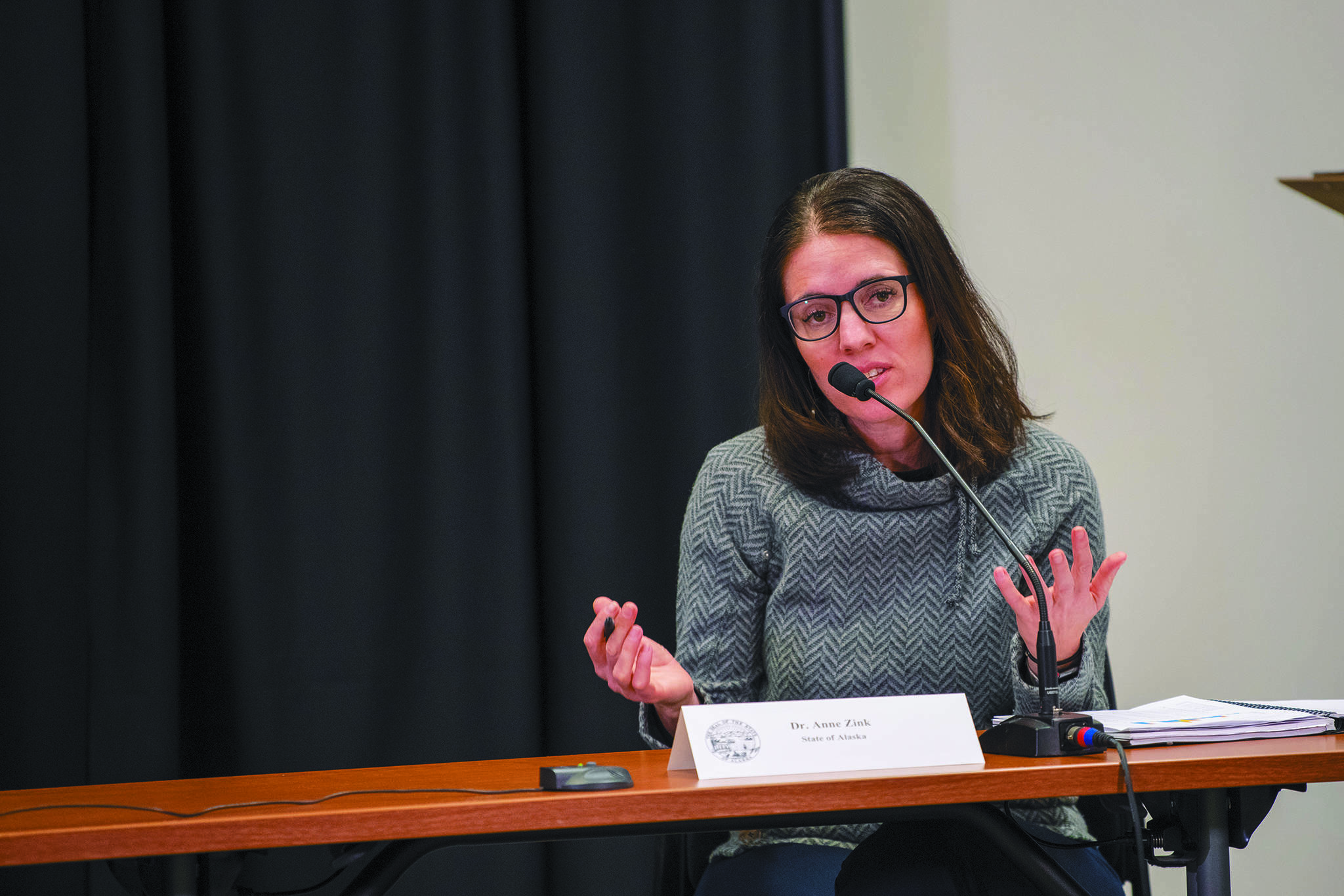The Soldotna City Council received a briefing Thursday from some of the state’s top COVID-19 officials on the state of the pandemic in Alaska and in the Soldotna area.
During a remote work session, the council was joined by Chief Medical Officer Dr. Anne Zink and State Testing Coordinator Dr. Coleman Cutchins and city officials.
In her presentation on the status of Alaska, Zink said that though cases continue to grow, more is known about the virus as time goes on.
Over the past week, the state has recorded more than 4,000 new cases of COVID-19 in Alaska, including more than 350 on the Kenai Peninsula. As of Friday, 34 schools in the Kenai Peninsula Borough School District, including all schools on the central peninsula, were operating 100% remotely through at least Nov. 25. City facilities in Kenai and Soldotna modified their operations last week in response to growing case numbers.
A glimmer of hope, Zink said, are the two new vaccines, which she said look “incredibly promising,” and that she expects to arrive in Alaska in a couple of weeks. Zink said that vaccine supply is expected to be extremely limited at first and that the state is working to determine which group will get vaccinated first. Additionally, the two vaccines require different storage. Pfizer’s vaccine must be stored in extremely cold temperatures, which is different from the state’s existing vaccine storage infrastructure. Moderna’s vaccine, which was announced shortly after Pfizer’s, does not need special storage and can be contained by Alaska’s current system. Because the vaccines were announced so close together, the state may not have to wait long for Moderna’s vaccine. There will also be a lot of coordination required, because both the Moderna and Pfizer vaccines involve two doses that must be administered a few weeks apart.
“While we’re asking a lot from Alaskans right now in so many different ways, I don’t think this is going to be forever and I think the end is getting much nearer,” Zink said.
Cutchins emphasized that local municipalities can play a big role in figuring out how to make sure everyone in their community actually gets the vaccine once it becomes available.
“The vaccine is only effective if more people get it,” Cutchins said. “When we talk about, we can have the best distribution plan, we can have the best vaccine, but that isn’t going to be helpful unless people in the community want to get the vaccine and do get the vaccine.”
Zink added that vaccines authorized under Emergency Use Authorizations cannot be mandated by the governor or by private businesses. Alaska’s full vaccination plan can be viewed on the Alaska Department of Health and Social Services website.
Zink said that identifying specific instances where cases arise is getting more difficult as the virus continues to spread, but that they consistently find cases coming from closed, indoor spaces where masks are not worn and social distancing is not followed. Zink said that activities that may have been safe in the summer are not safe anymore, which she said she doesn’t think people have realized.
Council member David Carey, who said at the last city council meeting that he had recovered from COVID-19, asked whether or not there was anything recovered patients could do to help combat the virus. Zink said that people can donate plasma, ideally right after they were sick, that can then be used as treatment. However, getting over COVID doesn’t mean that someone cannot contract the virus again, she said. In some instances, people have contracted the virus again within 90 days of recovering.
“Unfortunately at 90 days everyone goes back from a calculations standpoint to ground zero, because we see reinfection,” Zink said.
Soldotna Mayor Paul Whitney expressed concern about the community’s mental health heading into winter and compounded by the pandemic, especially among young people. Zink said that while current data do not show a spike in the number of suicides, overdoses or ER visits due to mental health, the state is seeing an increase in the number of new people calling their suicide call line.
Zink, who said she has a child in middle school and a child in high school, said that the pandemic will define their generation and that she believes in empowering young people to have agency over their role in the pandemic and to help them understand how they can be part of the solution. Zink suggested allowing young people to take more active roles in the community, such as delivering food, helping with vaccine distribution or social media messaging.
Council member Pamela Parker reiterated her belief that masks should be required in public spaces, but council member Justin Ruffridge pushed back on the idea, which he said would erode public trust in the council.
“I’ve heard over and over and over again that it’s going to take all of us,” Ruffridge said. “If we as a council make a decision to mandate something, that’s taking away the responsibility of our community to join us in fighting this disease together, and if we take that away ultimately I fear that what we’re going to get is a response in equal kind.”
Instead, Ruffridge said, he would support a public onslaught of messaging detailing positive ways the community can help each other and work together.
The full work session can be viewed on the City of Soldotna’s website at https://www.soldotna.org/.
Reach reporter Ashlyn O’Hara at ashlyn.ohara@peninsulaclarion.com.


